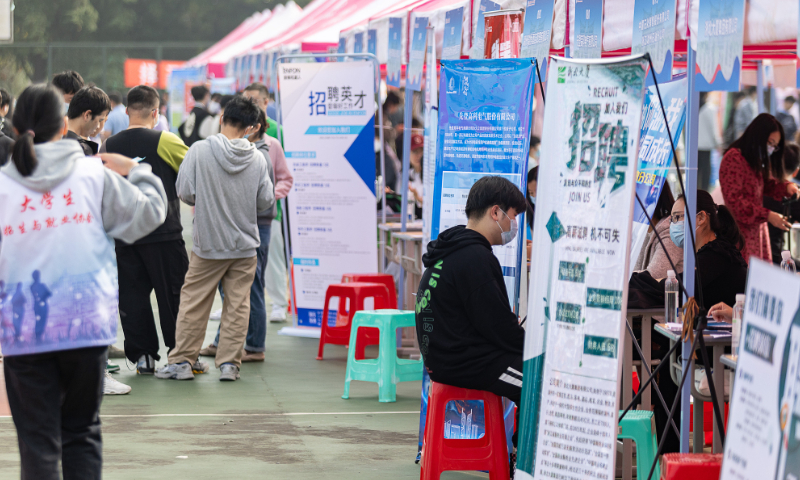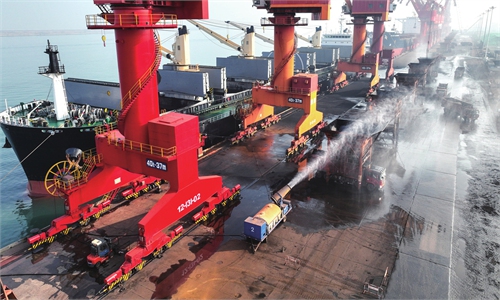
A job fair is held on November 12, 2022 at Huzhou Vocational and Technical College in East China's Zhejiang Province. Photo: VCG
Immediately after the Chinese Spring Festival holidays, China's local governments and enterprises are striving to enroll more workers as the economy is rapidly rebounding.They are using various methods to beef up work forces after the holidays, such as cross-provincial recruitment, livestreaming, face-to-face recruitment and remote interviews, and in some cases they're chartering planes and buses to get workers back to their posts.
In Ningbo, East China's Zhejiang Province, an economic powerhouse, the local human resources department organized a hiring trip by 11 key foreign trade enterprises in Southwest China's Guizhou Province, a major labor exporter, on the sixth day of the first lunar month.
An official of the human resources department of Haishu district, Ningbo, told the Global Times that 45 local companies provided more than 3,000 jobs in logistics, services, finance and new media at a job fair on Sunday.
Before the Spring Festival, the Ningbo human resources department surveyed 3,147 enterprises engaged in the city's key construction projects and in the foreign trading sector. The results showed that the post-holiday labor return rate hit more than 80 percent.
However, some firms still face labor shortages which are preparing to expand their capacity.
South China's Guangdong Province, another economic powerhouse, have ramped up efforts to lure migrant workers from other provinces. On the eve of the Spring Festival, 10 key firms and human resource organizations in Zhongshan city rode a cross-provincial recruitment bus to Hezhou, Guigang and other places in neighboring Guangxi Zhuang Autonomous Region to hire workers.
According to the 2023 Guangdong Government Work Report delivered on January 12, Guangdong's GDP reached 12.8 trillion yuan ($1.90 trillion) in 2022, a year-on-year increase of 2 percent, ranking first in China for 34 consecutive years.
While some provinces are competing for labor, others - particularly in the underdeveloped middle and western regions - are trying to convince workers to stay at home.
"Our company is recruiting inspectors and engineers, and each category needs 500-1,000 workers," a staff member surnamed Li from a state-owned company based in Northwest China's Gansu Province told the Global Times on Monday.
Li said that frontline workers are the highest paid, with salaries of more than 10,000 yuan ($1,485) per month, while ordinary employees get about 5,000 yuan.
The busy recruitment market reflects the resolve of local governments and enterprises in reviving the economy, experts said.
Domestic supply and industry chains are in a critical period of recovery after China optimized COVID-19 response at the end of 2022, and labor demand has increased as companies prepare for a busy year ahead, according to Xu Hongcai, deputy director of the Economic Policy Commission at the China Association of Policy Science.
People who work outside their home provinces face high costs and family separations. Therefore, as local incomes rise, more people are now willing to stay put, Xu said.



